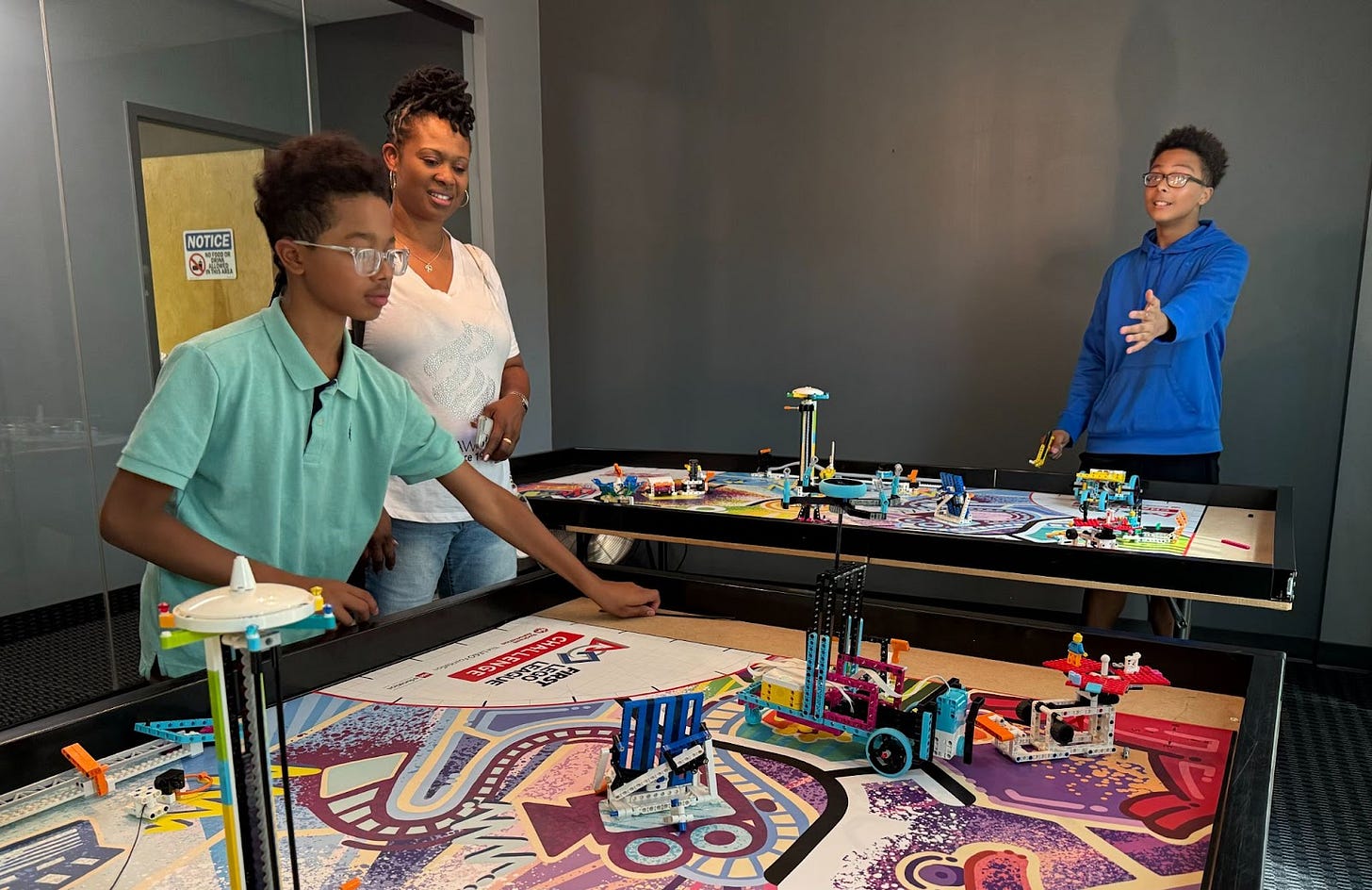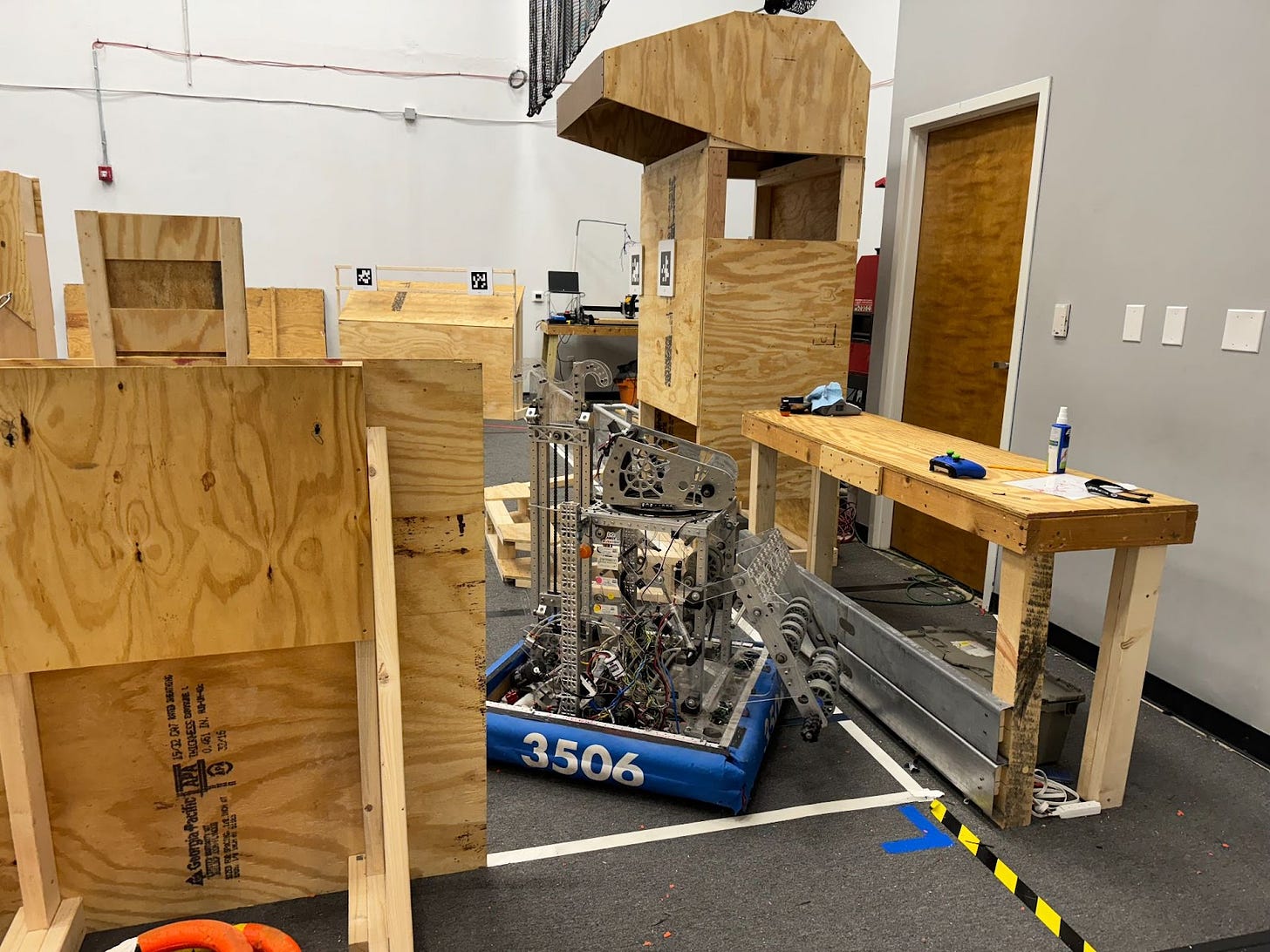Gears and growth at a robotics nonprofit
Queen City Robotics Alliance provides STEM education through summer camps, after-school programs and competitions teams
The following article appeared in the July 29, 2024, edition of The Charlotte Ledger, an e-newsletter with smart and original local news for Charlotte. We offer free and paid subscription plans. More info here.
Can a summer camp inspire a robotics career? For a decade, Queen City Robotics Alliance has ignited kids’ interest in STEM through serious competition and after-school programs.
Queen City Robotics Alliance hosts a summer camp for rising fourth through eighth graders to teach them beginner coding techniques and build a robot out of Legos.
by Lindsey Banks
Up until a few weeks ago, Jonathan Lesko, a rising seventh grader at Kennedy Middle School, had never built and coded a robot. He was interested in learning, so his mother signed him up for a week-long day camp this summer with Queen City Robotics Alliance, a local nonprofit that serves as a hub for youth robotics programs and competition teams.
Over the course of the week, Lesko worked with a team of rising fourth through eighth graders, all of whom were beginner coders, to design and construct a robot out of Legos and program the robot to move and push around objects.
Jonathan, 12, caught on quickly earning himself the nickname “master builder.” His team spent more than five hours coding their robot to move around a loop through the hallways of QCRA’s new facility in Ayrsley called The Zone.
One week of robotics camp was all Jonathan needed to decide he’d like to keep coding and join a team during the school year.
“The master builder will return,” Jonathan said as his mother picked him up from the final day of camp.
STEM programs like robotics are on the rise both within school systems and as after-school activities nationwide. The U.S. Bureau of Labor Statistics estimates that science, technology, engineering and math jobs in the U.S. will rise nearly 11% by 2031 — more than two times faster than all other occupations.
That’s where programs like Queen City Robotics Alliance come in.
QCRA was founded in 2014 as an umbrella fundraising organization for competition teams and events with FIRST Robotics, an international nonprofit organization for youth robotics. QCRA’s goal is to bridge the gap of STEM learning for Charlotte-area students. The nonprofit offers scholarships for its programs in an effort to get more students from Title I schools into robotics.
When QCRA moved into its new facility almost a year ago, the nonprofit was able to expand its services and serve as a meeting space and resource for camp, after-school programs and competition teams. Before The Zone, QCRA relied on schools to host programs.
Serious competition: QCRA’s summer camps are designed to give students a taste of robotics to determine if they want to commit to a competition team during the school year. There are nearly two dozen local middle school and high school teams across Charlotte, with the average high school team size of about 30 students. (One of the largest teams in the area, called Team YETI, has nearly 70 students on the team.) [Edited on 7/29/24 at 11:45 a.m. to correct the YETI team name to be all caps.]
The time commitment and structure of a FIRST team is similar to that of a sports team, said Robbie Hoyler, a mechanical mentor for the YETI competition team. Hoyler competed on his high school’s team in Hillsborough in the early 2000s.
Students log about 20 to 30 hours of work every week either after school or on the weekends during the competition season, which runs from January through April for the high school level, said student and YETI member Patrick Kilcoyne.
Kilcoyne, a rising senior at Ardrey Kell High, works on the YETI team’s mechanical side. He told The Ledger he plans to study mechanical engineering in college.
This year, the competition season has an ocean exploration theme, and teams across the world have roughly six weeks starting in January to build their robots before the league’s first competition, typically in March. The final competition of the season, the world championship, is typically held in late April.
The high school students’ parents usually volunteer to help build the practice field at QCRA while students begin designing and planning their robot. QCRA’s practice field is the only one of its kind in North Carolina, Hoyler said. The next closest model is in Atlanta.
Parent volunteers construct the practice field inside QCRA’s new facility for the competition season while students begin designing and building their robot.
Then, students spend just about every minute of free time to get their robot ready to compete. They meet after school and on the weekends perfecting their design at The Zone in Ayrsley.
When it’s time for competitions — which are often outside of Charlotte — teams use their robots to compete against each other to complete a specific task, like moving objects such as traffic cones to score points.
More than robotics: Beyond gaining skills programming robots, students also pick up skills in marketing and social media, as well as drumming up corporate sponsors to fund the team’s work. The average robot costs about $10,000 to make, so each team must fundraise to buy materials and pay for competition travel.
Students on the YETI team who wish to travel to competitions must also complete 100 hours of volunteer work in the community. Some students, like Kilcoyne, volunteer at the QCRA summer camp to log hours.
Competitions are not all about having the best robot, Hoyler said. YETI received the prestigious FIRST Impact Award at the state championship this year because of the team’s volunteer work in the community.
And not only are students learning valuable STEM and leadership skills and getting exposure to potential career paths, but they are building a community that spans the globe.
“You’re a part of something that’s much bigger than you,” Kilcoyne said, “and you’re helping spread that around.”
Lindsey Banks is a staff reporter for The Ledger: lindsey@cltledger.com
Need to sign up for this e-newsletter? We offer a free version, as well as paid memberships for full access to all 4 of our local newsletters:
➡️ Opt in or out of different newsletters on your “My Account” page.
➡️ Learn more about The Charlotte Ledger
The Charlotte Ledger is a locally owned media company that delivers smart and essential news through e-newsletters and on a website. We strive for fairness and accuracy and will correct all known errors. The content reflects the independent editorial judgment of The Charlotte Ledger. Any advertising, paid marketing, or sponsored content will be clearly labeled.
Like what we are doing? Feel free to forward this along and to tell a friend.
Social media: On Facebook, Instagram, Twitter and LinkedIn.
Sponsorship information/customer service: email support@cltledger.com.
Executive editor: Tony Mecia; Managing editor: Cristina Bolling; Staff writer: Lindsey Banks; Business manager: Brie Chrisman





